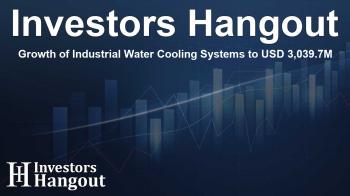Growth of Industrial Water Cooling Systems to USD 3,039.7M

Market Growth in Industrial Water Cooling Systems
The global industrial water cooling system market is set to experience substantial growth in the coming years. With projections estimating an expansion from USD 1,920.3 Million to USD 3,039.7 Million, this market reflects a compound annual growth rate (CAGR) of approximately 4.7%. The driving factors behind this growth encompass advancements in cooling technologies, energy efficiency mandates, and a surge in industrial activities particularly in manufacturing and chemical sectors.
Drivers of Market Growth
As industries evolve, the demand for efficient cooling solutions becomes increasingly pivotal. Industrial water cooling systems play a vital role in managing excess heat generated during energy-intensive processes. Enhanced efficiency in operations is necessary to avoid equipment damage caused by overheating. This necessity compels industries to adopt reliable and sophisticated cooling technologies.
Technological Advancements
Recent innovations have led to significant improvements in cooling systems. Modern heat exchangers and advanced control systems are making cooling solutions more reliable and performant. Consequently, industries are favoring these energy-efficient cooling technologies to alleviate regulatory pressures and commit to sustainability goals.
Market Forecast: Looking Ahead
The projected growth of the industrial water cooling system market reflects not just enhancements in technology, but also a broader movement towards sustainability in industrial practices. By implementing advanced cooling methods, companies can ensure efficient heat management imperative for continuous operations in the manufacturing, energy, and chemical industries.
Application of Heat Exchanger Technologies
Among the leading applications anticipated to flourish is the coupling of advanced heat exchangers and automated systems. These integrations facilitate improved energy performance by enhancing heat transfer capabilities and minimizing consumption. As industries strive to meet stringent environmental benchmarks while controlling operational costs, advanced cooling solutions are becoming essential in decision-making frameworks.
Key Market Insights
Based on extensive analysis, here are critical Insights from the ongoing trend in the industrial water cooling system market:
- The market is on track for a 4.7% CAGR, projected to hit approximately USD 3,039.7 Million by the end of the forecast period.
- As system efficiencies increase via automation and advanced heat exchangers, growth potential becomes more pronounced.
- Energy efficiency is no longer optional; regulatory frameworks motivate industries to adopt cutting-edge cooling solutions.
- Emerging markets such as India are set to showcase the highest growth rates, highlighting the increasing industrialization in developing regions.
Regional Market Dynamics
The dynamics of the industrial water cooling system vary across different geographical areas. Notable regions present significant opportunities:
North America
The North American market exhibits steady growth, with an expected CAGR of 3.7%, influenced by diverse industries, including manufacturing and energy production, that encompass stringent energy regulations.
Europe and Asia Pacific
In Europe, particularly the UK, a growth rate of 5.2% is anticipated due to technological advancements and supportive government measures. Meanwhile, in Asia, nations like India and China are navigating through industrial demands that support aggressive growth forecasts.
Conclusion: The Path Ahead
In summary, the industrial water cooling system market is aligning itself with trends that emphasize energy efficiency and sustainability. As industries continue to evolve and face escalating energy demands, the opportunities for advanced cooling systems will undoubtedly expand. As we look to the future, the necessity for effective, innovative, and eco-friendly cooling solutions stands as a pivotal element in industrial strategy.
Frequently Asked Questions
1. What is driving the growth of the industrial water cooling system market?
Key drivers include advancements in cooling technologies, energy efficiency regulations, and increased industrial activity particularly in manufacturing and chemicals.
2. What technologies are most relevant in the current market?
Significant growth is observed in heat exchanger technologies and automated cooling systems, enhancing overall system efficiency and performance.
3. How is the market segmented across regions?
The market is segmented into various regions, with significant growth in North America, Europe, and Asia, notably due to their industrial demands and regulatory frameworks.
4. What is the forecasted market value by 2035?
The market is projected to reach approximately USD 3,039.7 Million by 2035, marking a considerable uptick in demand for effective cooling solutions.
5. Why is sustainability a crucial factor in the market?
Sustainability is increasingly driving industries towards adopting advanced cooling technologies that comply with environmental regulations, culminating in better operational efficiencies.
About The Author
Contact Addison Perry privately here. Or send an email with ATTN: Addison Perry as the subject to contact@investorshangout.com.
About Investors Hangout
Investors Hangout is a leading online stock forum for financial discussion and learning, offering a wide range of free tools and resources. It draws in traders of all levels, who exchange market knowledge, investigate trading tactics, and keep an eye on industry developments in real time. Featuring financial articles, stock message boards, quotes, charts, company profiles, and live news updates. Through cooperative learning and a wealth of informational resources, it helps users from novices creating their first portfolios to experts honing their techniques. Join Investors Hangout today: https://investorshangout.com/
The content of this article is based on factual, publicly available information and does not represent legal, financial, or investment advice. Investors Hangout does not offer financial advice, and the author is not a licensed financial advisor. Consult a qualified advisor before making any financial or investment decisions based on this article. This article should not be considered advice to purchase, sell, or hold any securities or other investments. If any of the material provided here is inaccurate, please contact us for corrections.

